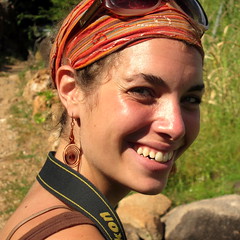
Yamikani at a conference. Her cap is scrawled with “Jesus,” but don’t mistake her for a proselytizer. She rarely raises the topic of religion with me, and we agree on numerous topics: improving access to contraception, encouraging girls to remain in school, spicy chips, handbags.
And so I found myself, on a breezy Sunday in July, at Yamikani’s Pentecostal church. I sat on a blue plastic lawn chair in an auditorium garlanded with gaudy drapes. Banners reading “2010, THE YEAR OF DOMINION” hung on the walls. A few people asked which church I attended in America. I told them it didn’t exist in Malawi. The answer made me feel a bit slimy, but I’ve met little success explaining my agnosticism or my confused religious heritage (a Catholic mother, a Jewish father, a lifetime of lighting the menorah as the Christmas tree twinkles in the corner).
We began by greeting each other with high fives. Nice! Way hipper than handshakes, and with recent reports of swine flu in Malawi, far more hygienic. The preacher’s stage presence was explosive. His voice boomed at the beginning and grew increasingly raspy as the sermon wore on. He beat his right hand up and down as if thumping a drum. Another man worked as Chichewa interpreter and personal sweat-mopper, chasing the preacher with a large white handkerchief. I admit, though, that I had trouble following the sermon, in which the preacher kept mispronouncing “irrevocable,” declared himself a lion, and accused another pastor of being a wizard (three days after they met, this wizard pastor died—don’t worry, though, our preacher assured us, “I did not kill him”).
My musings on wizardry were cut short, however, once it was time for personal prayers. “And if you can,” the preacher said, “you may speak in tongues.”
In what? Yamikani confirmed his words for me. Curiosity overtook skepticism and I strained to make out the voices of the congregants around me, but it was all a muddle—Chichewa, English, maybe some tongues.
As I rocked on my plastic chair, I instructed myself to be open-minded, but instinct told me this was bunk. I kept quiet, though, as the service proceeded. Near the end of the sermon, the preacher returned to the topic of witchcraft. I’ve grown accustomed to this topic during my time in Malawi. The daily newspapers carry frequent reports of witchcraft: men growing female genitalia, vindictive individuals preventing rain from falling over their neighbors’ gardens, invisible Satanists flying through the city, bewitched rats stealing money at local markets. Traditional healers set up stalls in the city center and in outlying townships, selling bottled herbs and gnarled roots. I try to stay mum when witchcraft enters the conversation, to remind myself that religion here is a blend of imported monotheism and traditional beliefs, but I couldn’t suppress an eye-roll as the preacher rehashed the topic. Then, however, he made me bolt upright.
“There is no witchcraft or sorcery—” he boomed.
Yes! Redemption! (In the rational, secular sense, of course.) Cogency!
The interpreter put his words into Chichewa.
“—that will work against me!” he continued. “In Jesus’ name, I am protected!”
I slumped back into my seat.



